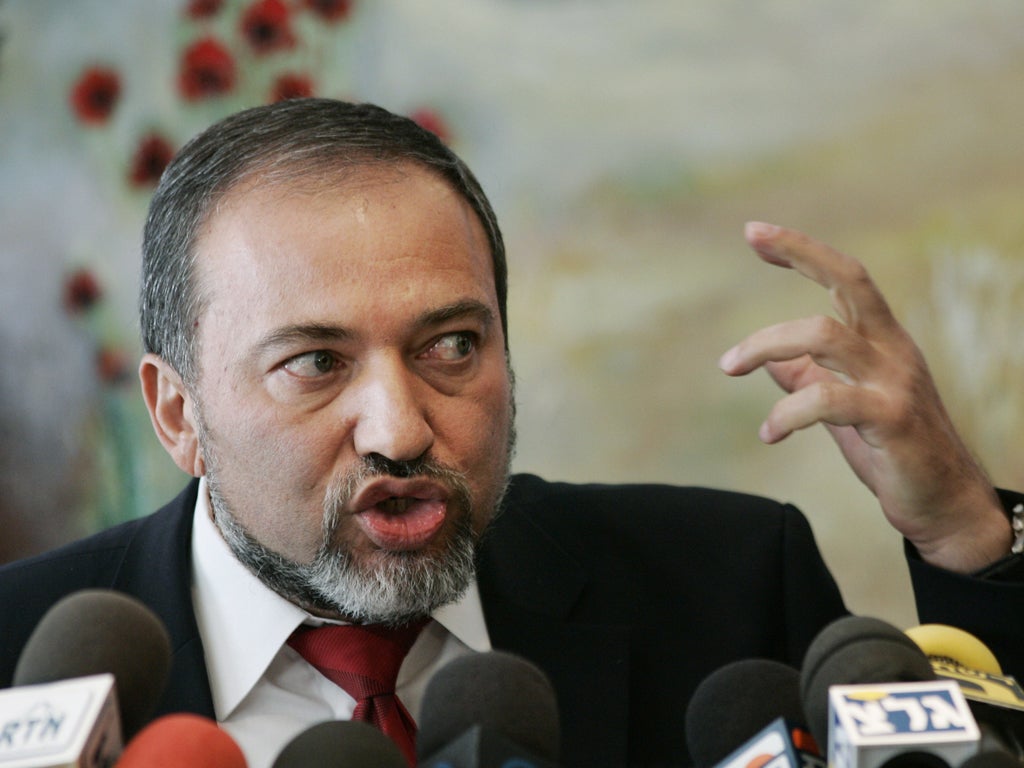Could corruption trial stop the rise of the black sheep of Israeli politics?

Your support helps us to tell the story
From reproductive rights to climate change to Big Tech, The Independent is on the ground when the story is developing. Whether it's investigating the financials of Elon Musk's pro-Trump PAC or producing our latest documentary, 'The A Word', which shines a light on the American women fighting for reproductive rights, we know how important it is to parse out the facts from the messaging.
At such a critical moment in US history, we need reporters on the ground. Your donation allows us to keep sending journalists to speak to both sides of the story.
The Independent is trusted by Americans across the entire political spectrum. And unlike many other quality news outlets, we choose not to lock Americans out of our reporting and analysis with paywalls. We believe quality journalism should be available to everyone, paid for by those who can afford it.
Your support makes all the difference.Described once by an American magazine editor as a "neo-fascist" and a "certified gangster", Israel's firebrand Foreign Minister Avigdor Lieberman is no stranger to controversy. It has not stopped him from building up a devoted following that has propelled his party to the forefront of Israeli politics.
But as a more than decade-long corruption probe nears its conclusion, even this canny political survivor may find that this is one controversy he cannot so easily dodge.
Mr Lieberman's lawyers will today attend the start of a two-day hearing to defend their client against charges of money-laundering, fraud, breach of trust, and witness tampering, following which the Attorney General will decide whether to launch formal criminal proceedings, a decision expected to take several weeks. If indicted, as Israeli analysts anticipate, the Foreign Minister, who founded and heads the ultranationalist party Yisrael Beiteinu (Israel is Our Home), is expected to quit his post in government, leaving some wondering if it will mark the beginning of his exile in the political wilderness.
But to write off the Moldovan-born politician would be to underestimate him. A derided figure abroad, he is a politician of some stature in Israel, where he commands a strong following from Russian immigrants, as well as drawing support from right-wing secularists who view the Prime Minister Benjamin Netanyahu's Likud party as too centrist.
The charges centre on the alleged funnelling of millions of shekels to shell companies controlled by Mr Lieberman during his time as a politician between 2001-2008 in apparent contravention of rules barring lawmakers from engaging in business activities or receiving funds outside of their salaries.
Publicly, Mr Lieberman has appeared typically unfazed by the charges, maintaining that he "always acted in accordance with the law". His supporters say it is no coincidence that the case against him was revived shortly before the 2009 elections, where his party won 15 seats in the 120-seat Knesset, making him kingmaker in the new government.
A former nightclub bouncer with a conviction for assaulting a child, Mr Lieberman began his career with Likud before forming his own party in 1999. Over the next decade, he held a series of government posts, but never for very long because of his fiery temper.
In the 2009 elections, he tapped into a growing nationalist fervour, campaigning on a platform that all Israelis should swear an oath of loyalty to the state, arguing that the Jewish State faced dangers not just from outside but also from its Israeli Arab minority, some 20 per cent of the population. While favouring a two-state solution, he went one step further, suggesting that Israeli Arab communities be transferred to a Palestinian state, while Jewish settlements in the West Bank, regarded as illegal under international law, become part of Israel.
For some, his anti-Arab rhetoric is part of the appeal. He once called for the execution of Israel's Arab politicians for meeting with members of the Islamist party Hamas and said he would gladly see Palestinian prisoners drowned in the Dead Sea.
Under Mr Lieberman, Israel's relations with erstwhile ally Turkey deteriorated to the extent that Ankara called for his dismissal, while European and US officials, including US Secretary of State Hillary Clinton, reportedly refuse to meet with him.
But predictions that Mr Lieberman will depart the stage may yet be premature. Even if he faces trial for corruption, few believe he will go to jail. Meanwhile, he will remain leader of Yisrael Beiteinu, and analysts say he will continue to pull the strings so long as his party remains a part of the coalition.
The Israeli electorate has shown forgiveness towards politicians convicted of corruption in the past, says Nadav Peri, a political commentator with Channel 10, noting the example of Aryeh Deri, a former interior minister convicted of bribe-taking, who is planning to return to politics. "Nothing can bury your political career in Israel," he said.
In his words: Avigdor Lieberman
"We must continue to fight Hamas like the United States did with Japan in World War II"
"Israel is under a dual terrorist attack, from within and from without. And terrorism from within is always more dangerous than terrorism from without"
"I think the biggest problem of the 21st century is how to deal with minorities... Every country where you have two languages, two religions and two races, you have conflict"
"Negotiations on the basis for land for peace are a mistake... and will destroy us"
"The dividing line does not run between Jew and Arab. The dividing line is between those who support terror and those who oppose it"
Join our commenting forum
Join thought-provoking conversations, follow other Independent readers and see their replies
Comments